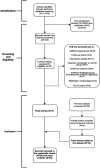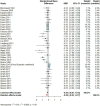School-based randomized controlled trials for ADHD and accompanying impairments: a systematic review and meta-analysis
- PMID: 40761448
- PMCID: PMC12318974
- DOI: 10.3389/fpsyg.2025.1611145
School-based randomized controlled trials for ADHD and accompanying impairments: a systematic review and meta-analysis
Abstract
Introduction: Children and young people with Attention Deficit Hyperactivity Disorder (ADHD) face disproportionate challenges due to core symptoms of ADHD (i.e., inattention and hyperactivity) interfering with academic, social, and behavioural functioning. The significant rise in the prevalence of ADHD and difficulties experienced by children and young people over recent years has put a lot more emphasis on school-based interventions. Despite this, and the tremendous amount of randomised controlled trials (RCTs) reporting school-based interventions for ADHD over the past decades, there has been no systematic reporting of the pooled effects of such trials in the literature.
Methods: This study seeks, for the first time, to report the effects of school-based RCTs on the core symptoms of ADHD and other difficulties, i.e., academic, social, emotional and behavioural (i.e., externalising). Search was performed in three journals, for interventions from 1980 to 2024 that targeted school-aged children (4 to 18 years old) with ADHD.
Results: In total, 26 randomised controlled trials met the inclusion criteria, 22 (n = 1962) of which were included in our meta-analyses. Our findings showed that school-based based randomised controlled trials were effective in improving combined ADHD (d = -0.28, p < 0.0001), inattention (d = -0.33, p < 0.0001), academic performance (d = 0.37, p < 0.0001), and social skills (d = 0.28, p < 0.001), and reducing externalising problems (d = -0.32, p = 0.001). There was no significant effect for hyperactivity/impulsivity (d = -0.09, p = 0.22).
Discussion: Our findings showed that school-based randomised controlled trials improve a range of difficulties experienced by children and young people with ADHD, but lack focus on hyperactivity/impulsivity. Future interventions would benefit from a more comprehensive focus on hyperactivity/impulsivity for system-wide improvement. Issues related to high levels of heterogeneity and potential reporter bias are further discussed.
Keywords: attention deficit hyperactivity disorder; intervention; meta-analysis; school; systematic review.
Copyright © 2025 Yegencik, Bell and Deniz.
Conflict of interest statement
The authors declare that the research was conducted in the absence of any commercial or financial relationships that could be construed as a potential conflict of interest.
Figures
References
Publication types
LinkOut - more resources
Full Text Sources
Miscellaneous








